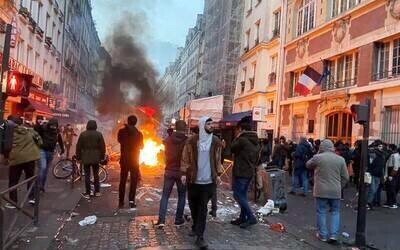A 69-year-old Frenchman has been charged with killing three people in Paris last week.
The attack targeted a Kurdish culture center, and three Kurds were murdered. Even though government authorities were quick to condemn the attack at the highest levels, there were days of protests and some riots and clashes after the killing.
Turkey’s ruling party and pro-government media have led a campaign to exploit the attack, not sympathizing with the victims but condemning the protesters as “terrorism supporters.”
Turkey has also summoned France’s ambassador, claiming protesters spread anti-Turkish propaganda. This is a new type of exploitation, where an extremist murders members of a minority, and then a foreign country condemns the minority and bashes the country where it took place.
This is the latest incident of extremism in France. In the past, migrants have been attacked in racist assaults, and other people have been attacked by extremists and terrorists. For instance, a kosher deli was targeted in 2015, and media figures, teachers, a priest, a Jewish school and other people and institutions have been attacked in recent years.
Turkish presence in Paris’ internal politics
Turkey has meddled in France’s internal politics in the past. After a French teacher named Samuel Paty was beheaded by an extremist, Turkey slammed France for “Islamophobia” – in essence, inflaming the tensions after the beheading.
Ankara’s new critique of France comes as Turkey has tried to get Sweden and Finland to crack down on dissidents and critics of Ankara. This often results in the targeting of Kurds, especially Kurds on the Left. Sweden and Finland want to join NATO, but Turkey, which is a member of NATO, has prevented them from joining until they agree to crack down on critics of Ankara. Recently, a court in Sweden appeared to prevent a dissident from being extradited.
“The shooting at a Kurdish cultural center and a nearby hairdressing salon on Friday sparked panic in the city’s bustling 10th district, home to numerous shops and restaurants and a large Kurdish population,” France24 reported. “Hundreds of people marched in Paris on Monday to pay tribute to the three Kurds shot dead.”
In contrast to French media and most international coverage of the attack, Turkish media quickly began to criticize the protesters. Turkish pro-government media called the protesters “terrorists.” This narrative was picked up by Ankara’s Islamist media and online supporters.
Why would Ankara seek to exploit this case in France?
Turkey claims it is fighting “terrorism” even though there is no evidence of the kind of claims Ankara makes. Ankara wants support for a new invasion of Syria. In Syria, Turkey claims to be fighting the “YPG” and “PKK,” two Kurdish groups. It claims that the US-backed SDF, another group, is the same as these “terrorists.”
This is a kind of Orwellian rhetoric that condemns every critic and group as “terrorists” as a way to excuse targeting them. For instance, after a recent bombing in Istanbul, Turkey carried out dozens of attacks on Syria, even though there was no evidence linking the bombing to Syria.
By quickly using the media to claim any protesters in Paris were “terrorists,” Ankara sought to prevent any criticism of Turkey and to prevent Kurds in France from being able to organize a protest.
Ankara fears Kurdish dissidents and any Kurdish groups abroad. It often works to target the Kurdish language, Kurdish music and flags. Ankara also knows that its opponents will sometimes use these events to raise their flags and voices, so it’s easier for Ankara to claim “terrorists” are protesting than to try to segment out the organized critics from the innocent average people.
Major media in the West didn’t portray the protesters as “terrorists” and generally sympathized with the Kurdish victims, even if some felt the riots were unacceptable.
The danger that Ankara’s intervention represents is that Ankara is always willing to exaggerate and even willing to summon ambassadors of European countries, or try to force NATO not to admit democracies like Sweden, in order to force European countries to suppress critics and minorities in the same way that Ankara does at home.
So far, it appears that France’s judicial system is doing the right thing and that peaceful demonstrations are now the norm in Paris. However, it should be noted that this incident of Ankara meddling in internal politics in France, just as it tried to do in 2020 with protests in the US, is a new escalation.
Ankara is seeking to exploit issues in Europe and the West to its benefit. Under the guise of claiming to be against “terrorism,” it has warped language to an Orwellian degree.
This is a remnant in some ways of the US “global war on terror” and the way countries such as Turkey took this to mean it could do whatever it wants as long as it labels its adversaries “terrorists.”







